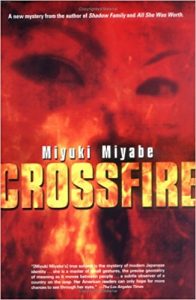This is a guest post by Kure Kamo. Kamo occasionally reviews for Strange Horizons, sporadically blogs at this is how she fight start, and tweets as @tihsfs, probably more than is good for him.
 translated by Deborah Stuhr Iwabuchi and Anna Husson Isozaki
translated by Deborah Stuhr Iwabuchi and Anna Husson Isozaki
Kodansha International
February 1, 2006
414 pages
One from the vault here. Miyuki Miyabe is one of Japan’s best-known authors, whose work ranges from video game tie-ins (Ico: Castle in the Mist), to stories of the supernatural (Apparitions: Ghosts of Old Edo), to straightforward police procedurals (All She Was Worth). Crossfire, first published in English in 2005, is an interesting combination of these last two genres. Set in Tokyo in the mid-1990s, it opens as Junko Aoki, a young woman with pyrokinetic abilities, accidently interrupts a kidnapping and torches some of the perpetrators. The subsequent crime scene bears similarities to the unsolved vigilante killing of another youth gang two years previously, leading to the involvement of Chikako Ishizu of the Tokyo police arson squad.
The story switches between these two PoV characters, as Junko hunts for the rest of the kidnappers and Chikako attempts to stay involved in the case despite the pressures of internal police politics–she’s only too aware that she’s the token women on the squad. The differing approaches the protagonists adopt towards establishing their places in the world drive the emotional side of the novel, and eventually prove to be very absorbing. The other characters are less well done; one of the book’s more significant flaws is the total lack of nuance with which the antagonists are drawn, and this exacerbates some of the pacing issues in what is otherwise a generally effective thriller.
The plot, with some irony, takes a long time to warm up. The early stages of Junko’s vigilantism consist of her tracking down and then burning a series of awful people in awful places while justifying their deaths to herself because these people were simply so awful they deserved it. The artless manner in which reader is positioned to agree that the baddies have it coming actually makes it harder to care about what happens to them, and by extension care about the person making it happen–let alone the person investigating the happenings at one remove. Fortunately, the first act ends with Junko discovering a wider conspiracy that suggests she isn’t the only one out there with supernatural abilities, while the arch pragmatist Chikako acquires a new partner with some oddball theories about pyrokinesis. (Think Mulder and Scully, but with a refreshing absence of sexual tension.) The story then opens up into something much more intriguing.
Crossfire was originally published in Japanese in 1998, and while notable for its engagement with gender issues, much of its politics might generously be described as ‘of its time.’ On the plus side the protagonists are both women, one of whom is middle-aged and pointedly ordinary in a way that’s still underrepresented in genre fiction, while the other wrestles with what it means to be a woman with genuine power in an overwhelmingly patriarchal society. The book isn’t interested in challenging the gender conceptions of late-20th century Japanese society so much exploring how women might accommodate themselves (or find themselves accommodated) within those conceptions. Which is fair enough in itself, but when the narrative voice trots out apparently sincere lines about innate ‘female curiosity’ and suchlike, you do wonder how much it crosses the line between accommodation and perpetuation. It’s also prone to bouts of moral panic, frequently indulging in blunt pronouncements about kids these days, painting the younger generation as immoral delinquents and generally bemoaning the state of the world. Again, this is done seemingly without irony or, until the very final pages, much in the way of critique.
The prose is functional at best, the characterisation relies too much on reported thought and emotion, and the plot has a couple of holes so large as to be actively distracting. And yet I would recommend reading it (which I guess is what I am doing). It’s reminiscent of Alan Moore’s Watchmen in how it depicts vigilantes weighing the balance of guilt and responsibility, the individual and the collective. After that slow start the story gathers a decent amount of momentum, and if Chikako and her storyline seem slightly underdone then that’s because they work primarily to throw the book’s other strand into sharper relief. Once it becomes clear that Junko might have options other than ploughing her own lonely furrow then her moral calculus becomes much more involved and engaging; for all the book’s blending of generic trappings, it’s the internal evolution of its principal heroine that sustains interest most strongly. The conclusions Crossfire reaches (because it’s still a conventional enough thriller to try to tie up all its loose ends) aren’t necessarily ones I like or agree with, but the journey it takes to reach them is, ultimately, one I appreciated going on.
